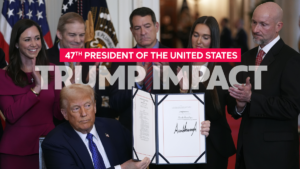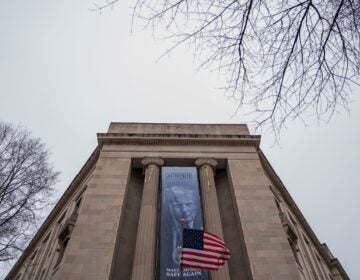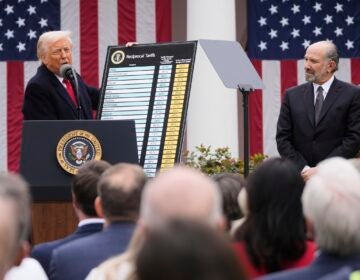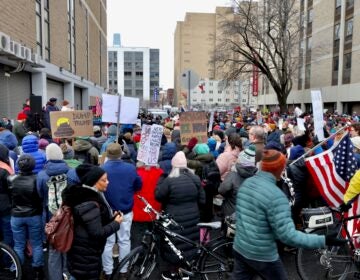Judge temporarily blocks Trump plan offering incentives for federal workers to resign
The ruling came hours before the midnight deadline for workers to apply for the deferred resignation program, which has been commonly described as a buyout.
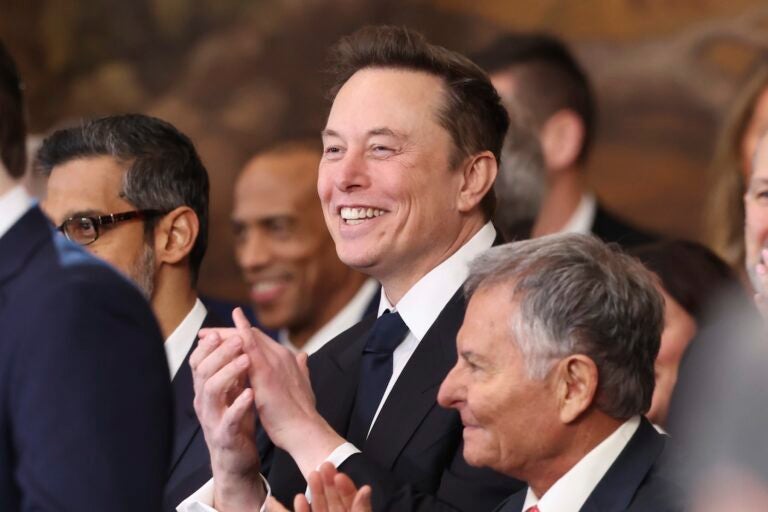
Elon Musk listens as President Donald Trump speaks after taking the oath of office at the 60th Presidential Inauguration in the Rotunda of the U.S. Capitol in Washington, Monday, Jan. 20, 2025. (Kevin Lamarque/Pool Photo via AP)
A federal judge on Thursday temporarily blocked President Donald Trump’s plan to push out federal workers by offering them financial incentives, the latest twist in a chaotic and distressing saga playing out for millions of government employees.
The ruling came hours before the midnight deadline for them to apply for the deferred resignation program. U.S. District Judge George O’Toole Jr. in Boston directed the administration to extend that deadline until after a court hearing he scheduled for Monday afternoon. O’Toole did not express an opinion on the legality of the program, which is being challenged by several labor unions, and said he would weigh arguments next week.
At the White House, press secretary Karoline Levitt said more than 40,000 federal workers have applied to leave in return for being paid until Sept. 30.
“We encourage federal workers in this city to accept the very generous offer,” she said at about the same time as the judge’s ruling came out. “They don’t want to come into the office. If they want to rip the American people off, then they’re welcome to take this buyout and we’ll find highly qualified people” to replace them.
The deferred resignation program was orchestrated by Elon Musk, the billionaire entrepreneur who is serving as a top adviser to Trump. It is part of the Republican president’s goal of remaking the federal government, weakening what his allies describe as the “deep state” that undermined his first term. Administration officials said they can save taxpayer money by presenting employees with “a valuable, once-in-a-lifetime opportunity.”
Democrats and unions warn that workers could be stiffed
On Wednesday, the administration ramped up its pressure on employees to leave, sending a reminder that layoffs or furloughs could come next.
“The majority of federal agencies are likely to be downsized through restructurings, realignments, and reductions in force,” said the message from the Office of Personnel Management, which has been a nexus of Musk’s efforts to downsize the government.
The email said anyone who remains will be expected to be “loyal” and “will be subject to enhanced standards of suitability and conduct as we move forward.” Some employees could be reclassified to limit civil service protections as well.
“Employees who engage in unlawful behavior or other misconduct will be prioritized for appropriate investigation and discipline, including termination,” the email said.
Democrats said workers shouldn’t accept the deferred resignation program because it wasn’t authorized by Congress, raising the risk they won’t get paid.
“It’s a scam and not a buyout,” said Everett Kelley, president of the American Federation of Government Employees.
Kelley said he tells workers that “if it was me, I wouldn’t do it.”
An employee at the Department of Education, who also spoke on condition of anonymity out of fear of retaliation, said the administration appeared desperate to get people to sign the agreement. However, she said there were too many red flags, such as a clause waiving the right to sue if the government failed to honor its side of the deal.
The deal is ‘exactly what it looks like,’ says Trump official
Trump put Musk, the world’s richest man, in charge of the so-called Department of Government Efficiency, which is a sweeping initiative to reduce the size and scope of the federal government. The original email offering the deferred resignation program was titled “Fork in the road,” echoing a similar message that Musk sent Twitter employees two years ago after he bought the social media platform.
Trump administration officials have organized question-and-answer sessions with employees as the deadline approaches.
Rachel Oglesby, the chief of staff at the Department of Education who previously worked at the America First Policy Institute, said Trump is trying to reduce the federal workforce.
“I know there’s been a lot of questions out there about whether it’s real and whether it’s a trick,” she said, according to a recording obtained by The Associated Press. “And it’s exactly what it looks like. It’s one of the many tools that he’s using to try to achieve the campaign promise to bring reform to the civil service and changes to D.C.”
The issue was also discussed during a meeting with Department of Agriculture employees, according to another recording obtained by the AP. Marlon Taubenheim, a human resources official, acknowledged that “these are very trying times” and “there’s a lot of stress.”
“Unfortunately, we don’t have all the answers,” he said.
Jacqueline Ponti-Lazaruk, another agency leader, said employees “probably didn’t have the runway of time that you might have liked to make a life-changing decision.”
For those who remain, she said, “we’ll just keep plugging along.”
Assurances from administration officials have not alleviated concerns across a range of agencies. Some federal workers said they did not trust the validity of the offers, doubting that Trump has the authority to disburse money. Others point to his record of stiffing contractors as a New York real estate mogul.
Musk’s plans spark demonstrations in Washington
Scattered protests have sprung up outside federal buildings, including on Tuesday at the Office of Personnel Management.
“I’m taking a risk and being bold and trying to get more federal workers to take a risk to speak out,” said Dante O’Hara, who said he works for the government. “Because if we don’t, then we’re all going to lose our jobs and they’re going to put all these loyalists or people that will be their shock troops.”
Government jobs have often been considered secure positions, but O’Hara said there’s fear in the workforce. The sense from his colleagues is “I don’t know if I’m going to be here tomorrow because, like, we don’t know what’s going to happen.’”
Dan Smith, a Maryland resident whose father was a research scientist at the Department of Agriculture, said federal workers are “so underappreciated and so taken for granted.”
“It’s one thing to downsize the government. It’s one thing to try to obliterate it,” Smith said. “And that’s what’s going on. And that is what is so frightening and disgusting and requires pushback.”
Mary-Jean Burke, a physical therapist for the Department of Veterans Affairs in Indianapolis, said she’s worried that too many people will leave, jeopardizing health care services.
Burke, who also serves as a union official, said doubts have also been growing over whether to take the offer.
“Originally, I think people were like, ‘I’m out of here,'” she said. But then they saw a social media post from DOGE, which said employees can “take the vacation you always wanted, or just watch movies and chill, while receiving your full government pay and benefits.”
The message backfired because “that kind of thing sounded a little bit too good to be true and people were hesitant,” Burke said.
Either way, she said, Trump has achieved his apparent goal of shaking up the federal workforce.
“Every day, it’s something,” Burke said. “If he signed up to be a disrupter, he’s doing it.”

Get daily updates from WHYY News!
WHYY is your source for fact-based, in-depth journalism and information. As a nonprofit organization, we rely on financial support from readers like you. Please give today.



